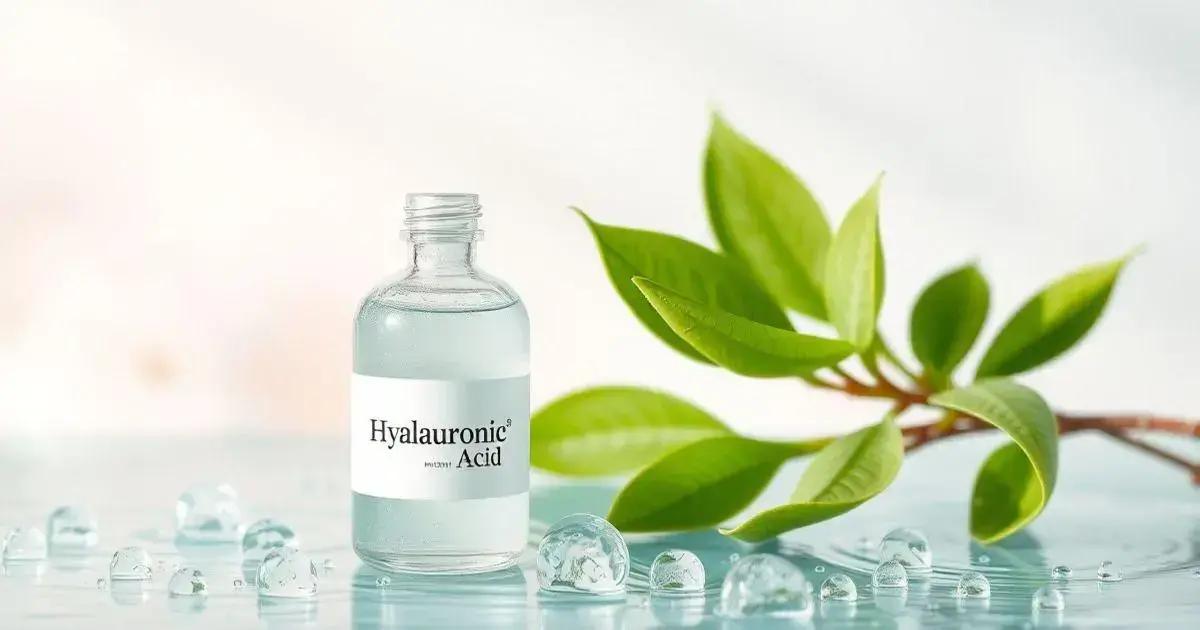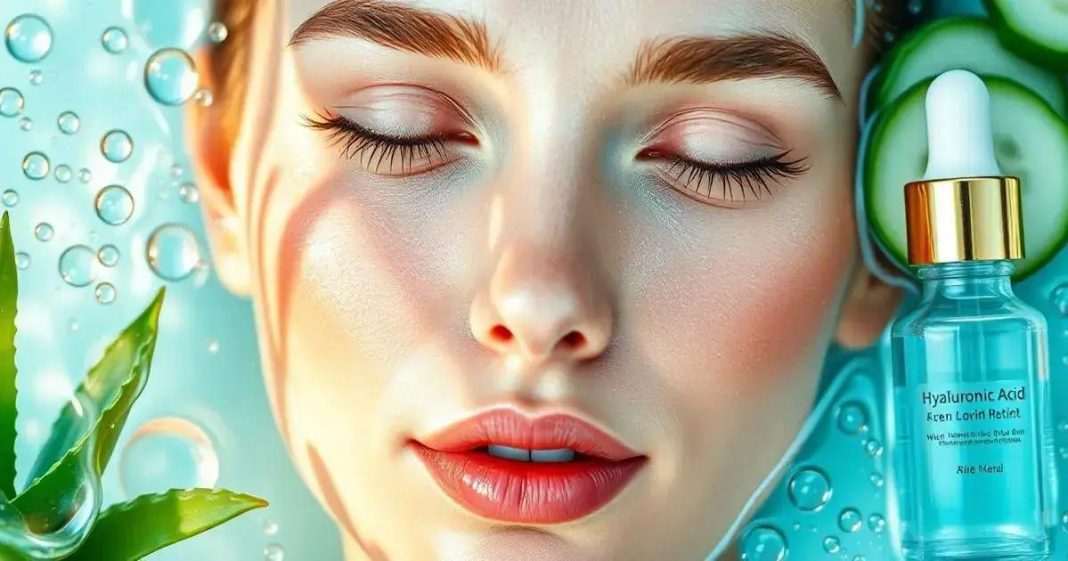Hyaluronic acid is a key skincare ingredient celebrated for its exceptional moisture-retaining properties, enhancing skin hydration, elasticity, and reducing fine lines. For optimal results, it should be applied to damp skin and layered with moisturizers. Its lightweight texture and superior hydration capabilities distinguish it from other moisturizers. When selecting products, prioritize serums with high concentrations of hyaluronic acid and additional beneficial ingredients tailored to your skin type, as this can greatly improve your skin’s overall health and appearance.
Hyaluronic acid is a powerhouse ingredient that has taken the skincare world by storm. Known for its remarkable ability to retain moisture, it has become a staple in many beauty routines. In this article, we’ll explore how hyaluronic acid can enhance your skin’s hydration, elasticity, and overall appearance.
What is Hyaluronic Acid?
Hyaluronic acid is a naturally occurring substance in our bodies, primarily found in connective tissues, skin, and cartilage. It plays a crucial role in retaining moisture, providing cushioning, and maintaining elasticity in the skin. This powerful humectant can hold up to 1,000 times its weight in water, making it an essential component for hydration.
As we age, the natural production of hyaluronic acid decreases, leading to dryness, fine lines, and a loss of elasticity in the skin. That’s why many skincare products now include hyaluronic acid to help replenish moisture and improve overall skin texture.
It’s important to note that hyaluronic acid is suitable for all skin types, including sensitive skin. Its lightweight texture absorbs quickly into the skin without leaving a greasy residue, making it a favorite among skincare enthusiasts.

Benefits of Hyaluronic Acid for Skin
The benefits of hyaluronic acid for skin are numerous, and this ingredient has become a go-to for anyone looking to enhance their skincare routine. Here are some key advantages:
- Intense Hydration: Hyaluronic acid’s ability to attract and retain moisture means it provides intense hydration to the skin, leaving it plump and smooth.
- Improved Elasticity: By maintaining moisture levels, hyaluronic acid helps improve skin elasticity, making it look firmer and more youthful.
- Reduction of Fine Lines: As skin becomes more hydrated, the appearance of fine lines and wrinkles diminishes, resulting in a smoother complexion.
- Soothing Properties: This ingredient is known for its calming effects on the skin, making it ideal for those with sensitive or irritated skin.
- Enhanced Skin Barrier: Hyaluronic acid strengthens the skin’s natural barrier, helping to protect against environmental stressors and retain moisture.
Incorporating hyaluronic acid into your skincare routine can significantly improve your skin’s overall health and appearance, making it a must-have ingredient for everyone.
How to Use Hyaluronic Acid in Your Routine
Integrating hyaluronic acid into your skincare routine is simple and can yield fantastic results. Here’s how to do it effectively:
- Choose the Right Product: Look for serums, creams, or moisturizers that contain hyaluronic acid as a key ingredient. Serums are often the most effective because they deliver a higher concentration of the ingredient.
- Apply on Damp Skin: For maximum hydration, apply hyaluronic acid when your skin is slightly damp. This helps the acid attract and lock in moisture more effectively.
- Layering is Key: If you use multiple products, apply hyaluronic acid before heavier creams or oils. This allows it to penetrate deeper into the skin, enhancing its moisture-retaining abilities.
- Follow with a Moisturizer: After applying hyaluronic acid, seal in the moisture with a good moisturizer. This will help prevent water loss and keep your skin hydrated throughout the day.
- Use it Twice Daily: For best results, incorporate hyaluronic acid into both your morning and evening skincare routines. This consistent use will help maintain hydration levels and improve skin texture over time.
By following these simple steps, you can effectively harness the power of hyaluronic acid and enjoy its numerous skin benefits.

Hyaluronic Acid vs. Other Moisturizers
When it comes to hydration, many people wonder how hyaluronic acid stacks up against other moisturizers. Here’s a closer look at the differences and advantages:
- Hyaluronic Acid: As a humectant, hyaluronic acid draws moisture from the environment into the skin, making it incredibly effective for hydration. Its lightweight nature allows for quick absorption without leaving a greasy feel.
- Creams and Ointments: Traditional moisturizers often contain occlusives, which are ingredients that create a barrier on the skin to prevent water loss. While these can be effective, they don’t always provide the same level of hydration as hyaluronic acid, especially in dry conditions.
- Glycerin: Similar to hyaluronic acid, glycerin is also a humectant that attracts moisture. However, hyaluronic acid can hold more moisture than glycerin, making it a more powerful hydrating agent.
- Natural Oils: Oils like jojoba or argan provide moisture by sealing it in, but they don’t hydrate the skin in the same way. While they can be beneficial for dry skin types, they may not offer the same immediate hydration effect as hyaluronic acid.
- Combination Products: Many modern moisturizers combine hyaluronic acid with occlusives and emollients to provide both immediate hydration and lasting moisture retention. These combination products can offer the best of both worlds.
In summary, while other moisturizers have their benefits, hyaluronic acid stands out for its exceptional ability to hydrate and attract moisture, making it an essential component for any skincare routine.
Choosing the Right Products with Hyaluronic Acid
Choosing the right products that contain hyaluronic acid can significantly enhance your skincare routine. Here are some tips to help you make the best choice:
- Check the Concentration: Look for products that list hyaluronic acid near the top of the ingredient list, indicating a higher concentration. This ensures you get a potent dose of hydration.
- Formulation Matters: Opt for serums or lightweight gels that absorb quickly into the skin. These formulations typically deliver hyaluronic acid more effectively than thicker creams.
- Additional Ingredients: Consider products that combine hyaluronic acid with other beneficial ingredients, such as antioxidants (like vitamin C) or peptides, to further boost your skin’s health and hydration.
- Skin Type Considerations: If you have oily skin, lightweight serums may work best. For dry skin types, look for creams or products that provide extra moisture alongside hyaluronic acid.
- Patch Test: Always perform a patch test before trying a new product, especially if you have sensitive skin. Apply a small amount to your inner wrist or behind your ear and wait 24 hours to check for any reactions.
- Read Reviews: Before purchasing, read reviews or seek recommendations from trusted sources. This can provide insight into how well the product works for others with similar skin concerns.
By keeping these factors in mind, you can confidently choose the right products with hyaluronic acid to enhance your skincare routine and achieve a radiant, hydrated complexion.
Conclusion
In summary, hyaluronic acid is a must-have ingredient in skincare that offers a multitude of benefits, from intense hydration to improved elasticity.
By understanding how to use it effectively and choosing the right products, you can harness its power to achieve a healthier, more radiant complexion.
Whether you incorporate it into your routine as a serum, cream, or moisturizer, hyaluronic acid can significantly enhance your skin’s appearance and overall health.
Don’t miss out on the opportunity to transform your skincare regimen with this incredible ingredient!
Frequently Asked Questions about Hyaluronic Acid
What is hyaluronic acid used for?
Hyaluronic acid is primarily used for hydration, helping to retain moisture in the skin and improve its overall appearance.
Is hyaluronic acid suitable for all skin types?
Yes, hyaluronic acid is suitable for all skin types, including sensitive skin, as it hydrates without causing irritation.
How often should I use hyaluronic acid?
For best results, hyaluronic acid can be used twice daily, in both your morning and evening skincare routines.
Can I use hyaluronic acid with other skincare ingredients?
Absolutely! Hyaluronic acid works well with most skincare ingredients, including antioxidants and retinoids.
Does hyaluronic acid have any side effects?
Hyaluronic acid is generally safe for most people, but it’s always best to perform a patch test, especially if you have sensitive skin.
How can I tell if a product contains enough hyaluronic acid?
Look for products that list hyaluronic acid near the top of the ingredient list, indicating a higher concentration.


